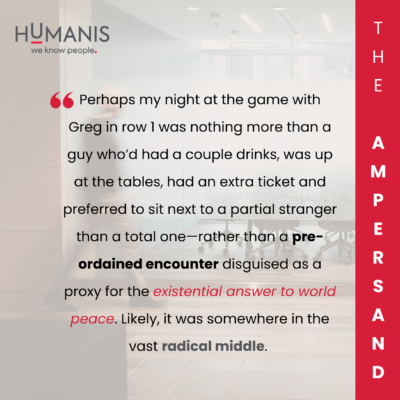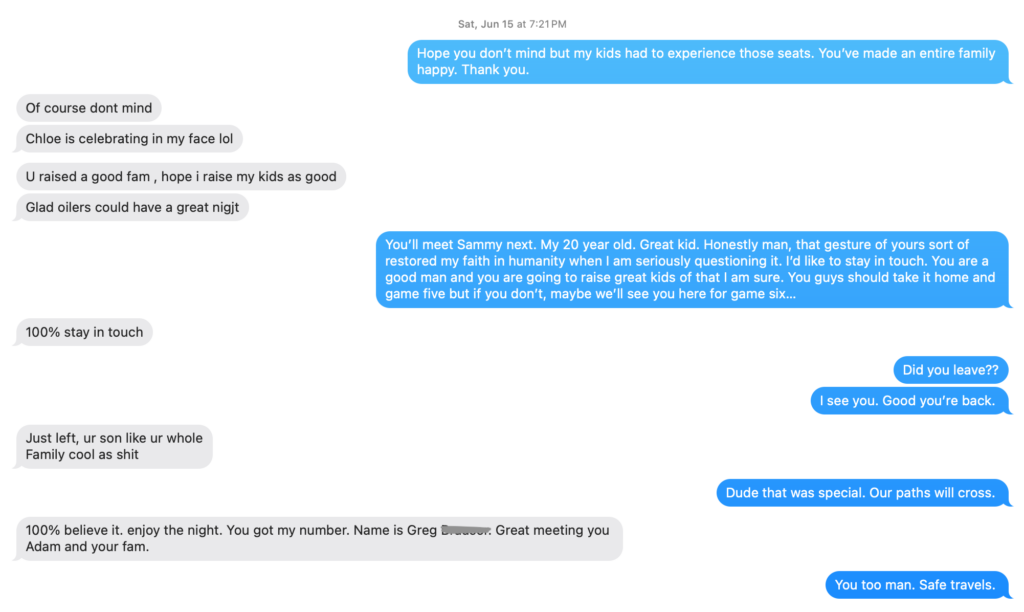

Listen to the Newsletter!
Dear Friends and Colleagues,
American novelist F. Scott Fitzgerald said, “The test of a first-rate intelligence is the ability to hold two opposed ideas in mind at the same time and still retain the ability to function.” Well, that settles it, I guess.
It’s not for lack of trying.
It’s just that the opposing ideas in the world lately are a little much. A convicted felon vowing revenge by imprisoning his critics is likely to be the next US president. A war rages in the Middle East, where the attacked are attacked for fighting back. An American golfer who abandoned the PGA Tour and now gets paid $125m by the Saudis, wins the US Open to raucous cheers of USA! USA! A billionaire, the CEO of “X,” mocks democracy and human rights yet is seen as a champion of freedom by millions. Another one, the CEO of Meta, admits to spying on users, but the stock price soars as investors applaud his honesty.
Closer to home, a city renowned for its engineering excellence in constructing some of the world’s most complex pipelines, runs low on water as it’s ‘Feedermain’ snaps in pieces, depleting reserves, quickly devolving into a communications cluster and, incredibly, though predictably, descending into a partisan bun fight. Last and, in the grand scheme, most certainly least, the past five Stanley Cups have featured a team from Florida (?!), including the heartbreaking Panthers victory last week over my beloved Edmonton Oilers. Black is white, up is down.
While I can’t explain much of what’s going on around me, a beautiful moment of clarity, actually, just a beautiful moment, occurred during the aforementioned Stanley Cup run. One that temporarily, at least, restored my faith in humans, though not quite yet in humanity. Ironic, perhaps, given that sport, no less hockey, is the last bastion (or perhaps the first), of unhinged partisanship.
The abridged version goes like this: as lifelong Edmonton Oilers fans, my family needed to be there to take it all in. Within moments of securing a spot in the Final, we dipped into the kids’ inheritance and secured an Airbnb and tickets to games three and four. My youngest, 17, and I would attend game three on Thursday; my wife and other two, 20 and 23, game 4 on Saturday. On the Friday evening, having fallen behind 3-0 in the series and facing elimination, my wife and I decided to wander into the casino to play a few hands of blackjack. As you do.
At the table sat two rather boisterous Florida fans, one – Ryan – in sunglasses, a red Panthers visor, yellow shorts, a pink golf shirt and flip flops, a veritable billboard for the Sunshine State. The other, much younger – Greg – in a more restrained Panthers hoodie, but no less unlikeable on first impressions. Two rather intoxicated white guys from South Florida, ripping Joe Biden, lamenting downtown “Deadmonton,” and tossing $100 chips around like the “play money” Canadian currency was to them. Clichés were confirmed. Impressions imbedded. Drinks downed. Unease set in when Greg, a small stack in front of him, having made a bigger one in Crypto, delivered a flurry of zingers toward our Asian dealer, mockingly speaking Chinese at him. Or so I thought. He was most certainly speaking Chinese, but there was nothing mocking about it. Greg delivered the first of two surprises that evening when the dealer responded, and the two carried on in impeccable – I assume – Cantonese for the next several minutes.
The second was when Greg asked if I was going to the game the next night. I explained I had been the night before with my youngest, and seeing as he was in a golf tournament in Stony Plain the next evening, I would sit out game four and my wife and other two kids would get their turn. As the evening wore on, Greg from Sunrise, Florida, the Caucasian Cantonese-speaking Crypto-currency-trading story-telling gambler, was making money and giving the Dos Equis World’s Most Interesting Man a run for his.
At one point, Greg asked for my phone number. Presumably so he could trash-talk me the next night when his team swept the series. I obliged and ignored the ‘ping’ on my phone, focusing instead on what to do with a hard 16 against the dealer’s 9.
“Look at your phone,” winked Greg, with the mischievous look of a kid who’d left a whoopee cushion under a sofa seat. I snuck a peak.

Game 4, Row 1, on the glass. Whoopee indeed. I looked at him in disbelief. “What can I pay you?” I asked, equal parts stunned, skeptical and suspicious. “Two beers and the pleasure of your company.” The next night, rather than watching alone in a rented Airbnb, I sat on the glass with Greg from Sunrise, Florida. Immediate bonds were formed, unaided by any liquid courage (Greg waived the two-beer fee, having been overserved the night before). In our seats early, we chatted at length about friendship, fatherhood, fate, and even faith (not one of my Go-To’s at times like this, though I would soon be praying for an Oilers win). Greg has a 6-month-old and a 3-year-old and the whole dad thing has him a bit spooked, unsure exactly how it all works. I tried my best, hardly in possession of all the answers, and the young Grasshopper listened intently. He FaceTimed his wife to introduce me. Lovely woman. I met the kids, too. Then, after the first period, Greg met mine. I couldn’t enjoy this moment without sharing it with my kids. So, in the second Greg sat with Chloe and in the third, with Sammy. Needing to catch a red eye back to Miami, and the Oilers up 6-1 after two, Greg left early allowing the two kids to share the jubilant moment for the duration, banging the glass and high-fiving strangers, while my wife and I looked on from the nosebleeds, beaming at their joy and reflecting on the whole encounter.

Our text thread tells the rest of the story.

But that’s not the end of the story. When the Oilers eventually lost the series, not in five or six, but a heart-breaking one-goal game-seven nail-biter, the blow was softened knowing Greg in Sunrise, Florida was smiling and for having been granted this incredible family memory, not just by a team I’ve rooted for my entire life, but by a guy I’d met at the tables the night before.
And while the loss filled me with momentary sadness, the experience instilled in me a new belief in the kindness of strangers and, for a fleeting moment, the goodness of humankind. For here we were, two very different guys, separated in age by decades, living on opposite corners of the continent, rooting for opposing teams, brought together by the undeniable uniting force of hockey, booze and gambling.
Okay, maybe that’s not the moral of the story. The moral of the story is that we’re all trying to make sense of the world around us, even as it becomes harder to understand. Whether it’s about how to be a good dad or solving the Middle East, we live in complicated times, choosing to reside in our own echo chambers to amplify our preferred narrative. Neither the “progressive” left nor the “far” right have distinguished themselves of late. In many ways, they’ve become indistinguishable. I, for one, am a card-carrying member of the Radical Middle, that 80% swath that lives in the vast expanse between the two polarized extremes.
The Radical Middle doesn’t shout, or threaten, or protest behind (or about) masks. It wants its society to function, its less fortunate looked after, its hospitals clean, class sizes manageable, roads paved, government small, taxes fair, neighbourhoods safe, and its water to come out of the tap. Its platform is based upon more kindness and less judgement. It requires us to embrace complexity rather than seeking simple answers, to listen more and condemn less. Its inspirational leader is Ted Lasso and, as with the Edmonton Oilers, its mantra is to Believe, even when you come up short.
The Radical Middle is not about complacency or inaction; it’s about pragmatic solutions and thoughtful discourse. It’s a place where reasonable and informed dialogue thrives and where understanding is prioritized over winning an argument. In the Radical Middle, compromise is not seen as weakness but as a necessary tool for progress. It’s about finding common ground and recognizing the shared humanity in each of us.
This Radical Middle values evidence over ideology, progress over partisanship, and action over rhetoric. It demands a balance between individual rights and collective responsibilities. The Radical Middle aims to create policies that work in the real world, acknowledging that perfect solutions are rare, and that effective governance often involves trade-offs. It seeks to build bridges, not walls, fostering an environment where diverse ideas can coexist and contribute to a more harmonious society. It doesn’t mean we have to agree; certain issues of the day are quite simply unbridgeable, where there actually aren’t “fine people” on both sides but more than a few in the middle.
Perhaps my night at the game with Greg from Sunrise, Florida was nothing more than a random encounter with an interesting guy who’d had a couple drinks, was up at the tables, had an extra ticket and preferred to sit next to a partial stranger, than a total one and not some mystical meeting meant to unearth the existential answer to world peace. Most likely, like most things, it was somewhere in the vast Radical Middle. But it did cause me to check my own biases and allow for a second opinion to trump a first impression (pun intended), as we each wrestled with some of the bigger questions we’re all trying to answer.
Keeping an open mind, no less being willing to change it, is a lesson I’d urge our clients to consider too. Not all candidates appear to ‘meet the spec’ on first glance but if you commit with intellectual honesty and genuine curiosity, the old lesson of not judging a book by its cover sometimes holds true. Indeed, we often find ourselves advocating for the underdog, even challenging our clients to trust our judgement and their gut in considering an outcome they hadn’t initially contemplated. And if, like me, you are a card-carrying member of the Radical Middle, you will be required to confront the uncomfortable reality that navigating today’s world requires you to have the ability to hold, though not necessarily agree with, two opposed ideas in mind at the same time.
Now, can the rest of the world do that? Being the stuff of “first-rate intelligence” I have my doubts.
Regards,
Adam